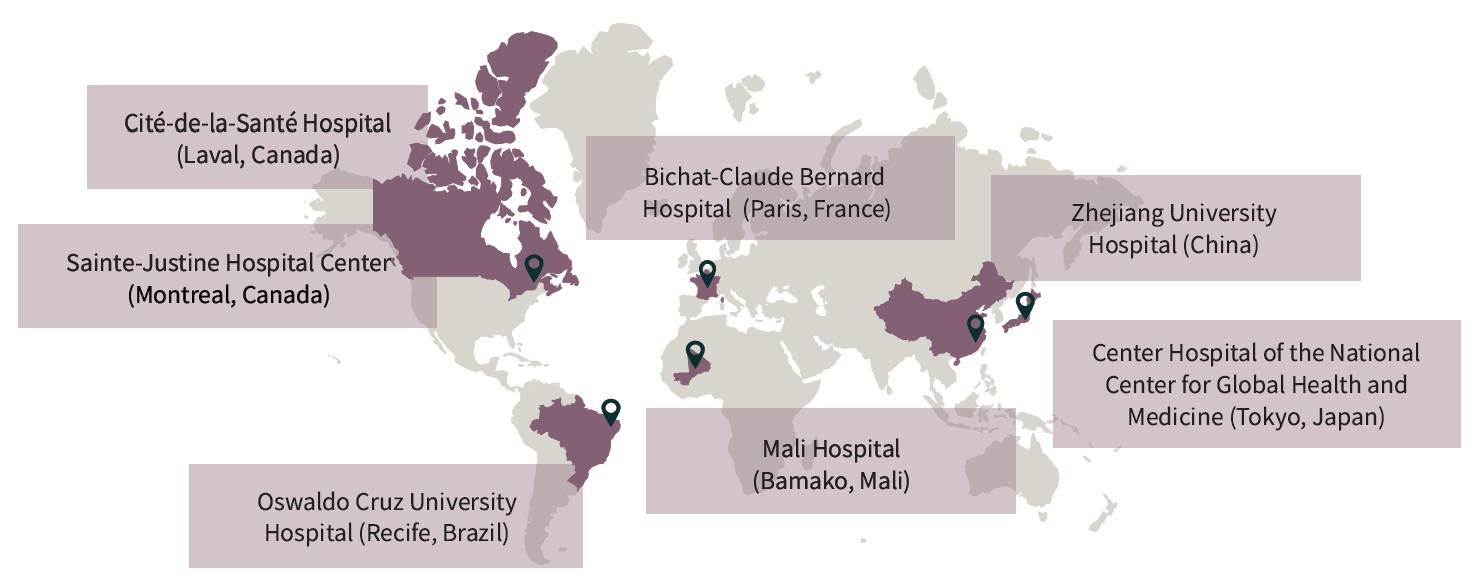HoSPiCOVID project
What is the resilience of public health systems, hospitals and their staff to the COVID-19 pandemic? A multidisciplinary research project in Brazil, Canada, China, France, Japan and Mali to share lessons learned.
Context of the study
Beyond essential biomedical research, it is imperative that the COVID-19 pandemic be studied in terms of its impact on public health, health care systems, and practitioners and support staff.
Indeed, much of the current global effort is aimed at reducing the burden of COVID-19 on health systems and hospital personnel, which have been strained since the beginning of the pandemic. Hospitals have had to rapidly adjust services and assuring adequate personal protective equipment and medical equipment all the while treating patients with a novel virus. Public health has had to organize and implement mass COVID-19 testing for the general population as well as undertake contact tracing of confirmed cases. Despite these massive endeavors and challenges, little research has yet been undertaken to understand the impact of COVID-19 on healthcare and public health systems, as well as on the practitioners and support staff within these systems.
Why this study?
There is an urgent need to understand how public health institutions, hospitals, and their staff have coped with the current crisis. Understanding the resilience of health care and public health systems is central to this study. This notion of resilience refers to the capacity to adapt and transform in order to maintain functioning (public health and health systems) services in the context of such a crisis.
What is the scientific objective?
The scientific objective is to understand the resilience of public health organizations, hospitals, and their staff in the context of the COVID-19 crisis and to compare resilience between six different countries: Brazil, Canada, China, France, Japan and Mali. This study aims to generate lessons learned for health professionals and decision-makers, based on rigorous interdisciplinary research.
What is the operational impact of the study?
The operational objective is to develop an effective knowledge transfer strategy to share lessons learned between countries. These lessons will focus on how public health organizations, hospitals, and their staff have operated in six different countries to cope, adapt, and transform during the various phases of the pandemic.
Workshops in each country and a final international workshop in the summer/fall of 2021 will bring together policy and decision makers, hospital and public health professionals, researchers, and civil society organizations to collectively produce operational recommendations. This knowledge transfer strategy, based on the project’s evidence and the expertise of the participants, will enable the sharing of lessons at an operational level.
With what scientific approach?
The methodological approach of this research is a multiple case study. We chose these six countries as they represent different continents, contexts, and stages of the pandemic. This will allow for a rich international comparison to develop robust lessons learned. In addition to public health organizations, our study will be conducted in seven major COVID-19 referral hospitals (CF picture below).
An initial exploratory approach will provide an overall view of the situation and major challenges faced by each hospital as well as with public health partners. In-depth analyses will follow that will focus on specific themes (e.g. organization of care, guidelines, staff protection, testing and contact tracing strategies) using a comparative perspective. Our research will be based on qualitative data from field observations, interviews with professionals, and document analyses. Epidemiological analyses will support the qualitative research.
With which scientific team?
The research team is made up of international and national experts in epidemic response, analysis of healthcare and public health systems, and knowledge transfer.
It is a multidisciplinary team made up of specialists in epidemiology, medicine, public health, social sciences, and geography. These researchers come from the following institutions:
- University of Montreal School of Public Health (ESPUM) – Canada,
- Hitotsubashi University – Japan,
- Fondation Oswaldo Cruz (FIOCRUZ) – Brazil,
- Research Institute for Sustainable Development (IRD) – France,
- Population and Developpement Center (CEPED) – France,
- Center for Research in Public Health (CReSP) – Canada,
- National Centre for Global Health and Medicine – Japon,
- National Institute of Health and Medical Research (Inserm) – France,
- Research structure “Infection, antimicrobials, modeling, evolution” (IAME) – France,
- Assistance Publique Hôpitaux de Paris (APHP) – France,
- ONG Miseli NGO – Mali,
- Équipe Renard – Canada.

Presentation of the 7 hospitals studied by the HoSPiCOVID project
